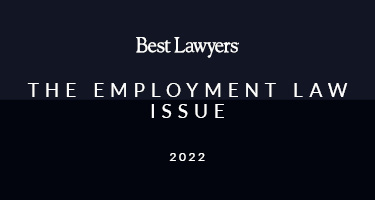Irina Anyukhina of ALRUD Law Firm—Russia’s 2020 “Law Firm of the Year” honoree in Labor and Employment Law—joins Phillip Greer, CEO of Best Lawyers, to talk about how their firm has been at the forefront of the equal pay and #MeToo movements. In addition, she talks about some of the domestic changes in labor law that are happening in Russia.
Best Lawyers: Congratulations on your law firm being named “Law Firm of the Year” for Labor and Employment law in Russia. As one of the leaders in this field, you've been tapped and lent your expertise to major reports such as the European employment law updates. Can you discuss some of the key issues affecting employment law in the EU? What are some of the key issues affecting employment law right now in Europe?
Irina Anyukhina: I would say two major and quite important things both, from my perspective for Europe, will also have some effect in Russia.
The first issue I would mention is equal pay for equal work. I understand that this topic is widely discussed in the EU. The EU has introduced or is introducing new instruments to enforce compliance with this basic principle. Germany is one of the main countries driving this change around equal pay for equal work. Companies are now obliged to respond to requests for pay information in the United Kingdom, as far as I know.
In the Russian Labor Code we have the same principle, but we do not have the requirements for making this information public. This principle implies from a Russian law perspective setting all the same salaries for employees that keep the same job position and scope of job duties.
This is a very formal approach towards this principle, we are particularly interested in the EU developments in this area, so they may have an effect on Russia in the future as best practices.
The second issue, GDPR, is one of the hottest topics for the European Union. It is not applied in Russia directly, but it affects those companies who have a presence in Russia or even contracted relationship with the Russian companies. On the other side, it also impacts Russian companies with international European operations. We even saw that there were some efforts on the governmental and legislative level to harmonize our local data protection legislation to put it in line with the GDPR principles or some aspects.
The #MeToo movement has prompted a wave of new legislation and harassment reform here in the U.S. Russia, however, has no legal definition for harassment, which must present some unique challenges for claimants. Can you discuss the impact of the #MeToo movement in Russia and its impact on employment law?
IA: We see that global anti-harassment movement in the U.S., including the #MeToo movement, and we obviously see that it has impact on Russia, as well. Although this movement did not yet result in any major legislative changes in Russia, we see changes from a practical perspective with the U.S. companies, the international companies that have operations in Russia. They adopt policies locally, here in Russia, imposing zero tolerance for cases of sexual harassment at workplaces. For instance, disciplinary action may be taken against the individual for violation of the code of conduct imposing zero tolerance for sexual harassment in the workplace. This trend increased during recent years and there are more and more court cases which unfold by the claimants, to Russian courts which are related to harassment at workplaces.
Speaking on news and employment law, late last year, Putin signed into law a pension reform bill raising retirement age. What does the raised retirement age mean for Russian workers who are expecting to see their pension in the new year? Are there any realistic avenues for pension reform?
IA: There were and there are still lots of challenges that came with implementing this new pension reform and everybody affected is still figuring this out. It is fair to say that in Russia we had one of the lowest pension ages in the world and the increase on the pension age just brings it up to the level of other countries, at least closer to that level.
Actually, this reform was launched in a way so not to create lots of social tension. The pension age will be increased not at once but gradually. Each year one additional year will be added to the pension age until it reaches the new threshold. The whole transition period will take up to five years. There are some mechanisms for those who are the most affected, those who are at the pre-retirement age. Moreover, within this pension reform, those employees, those workers who were expecting to see their pension in the upcoming two years, they will have a right to retire six months in advance of their retirement age. That should make a smoother transition.
In fact, since it is not possible now to evaluate all the impacts that the pension reform will bring, there is a trend among our clients, to work with private pension funds and non-state pension funds to provide some kind of additional pension benefits to employees. Another trend is to include a switch into foreign based pension schemes or deliver cash payouts to locally based employees so that to increase their level of protection from the pension perspective.
This interview was edited for brevity and grammatical clarification.

































